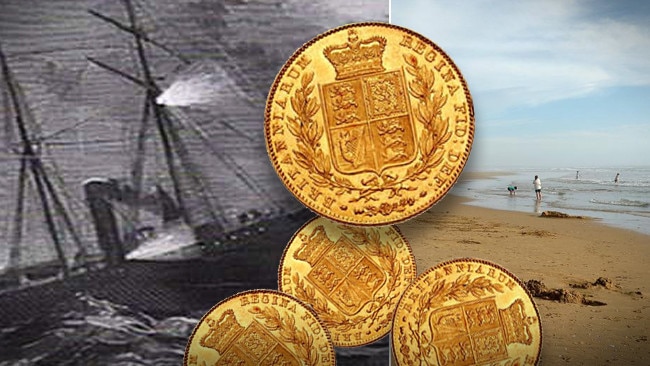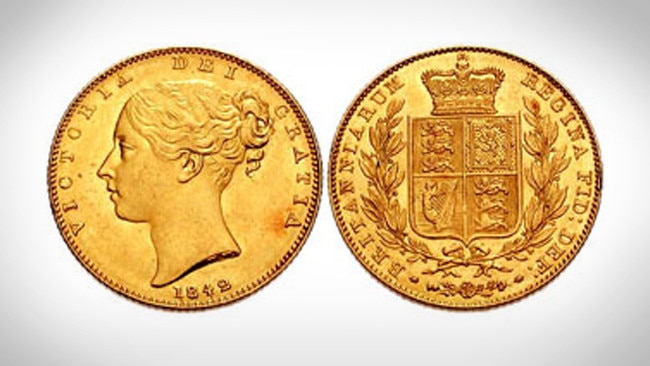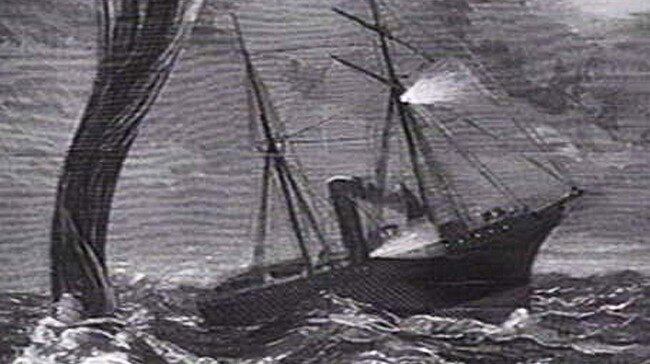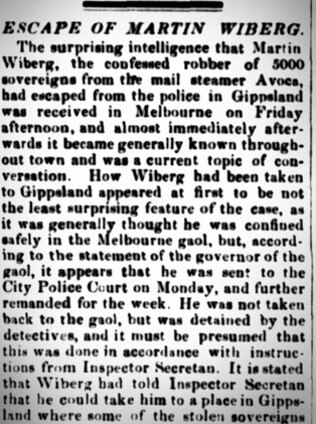Mitchell Toy: Gold coins stolen in 1877 ship robbery could still be hidden in Inverloch
THOUSANDS of gold sovereign coins stolen in a daring ship robbery 140 years ago might still be hidden in the sands and caves around Inverloch.

VIC News
Don't miss out on the headlines from VIC News. Followed categories will be added to My News.
HOLIDAY-makers running their fingers through the sand near the mouth of the Tarwin River at Inverloch this summer could come close to touching part of an enormous bounty of stolen gold, hidden by a thief who twice dodged authorities 140 years ago.
In 1877 a shipment of gold sovereign coins was being transported from Sydney to Sri Lanka via Melbourne in a collection of heavy chests.

But when the treasure was hauled off the ship SS China at its destination, one of the boxes, meant to hold 5000 gold sovereigns, was instead found to contain iron bolts and pieces of lead.
In today’s money it would be just shy of $1 million.
MORE MITCHELL TOY: VICTORIA’S BEST CONSPIRACY THEORIES
The rush was on to figure out who had been in contact with the cargo and inquiries led the chief officer of the ship Avoca, which had earlier transported the chests between Sydney and Melbourne, to be sacked for negligence.
But the main suspicion soon fell on a young ship’s carpenter, Martin Wiberg.
According to some accounts, Wiberg had been in an argument with of the ship’s senior officers and dismissed around the same time the gold went missing.
It was also supposed that he had the trade expertise to gain access to the monitored and fortified cabin on the Avoca in which the gold was housed, open the chest and close it off again in a way that wouldn’t be noticed.
Some theories suggest Wiberg accessed the cabin from the deck below then sealed off his entry point, while others suggest he was called upon to fix a lock on the cabin door and, although watched by guards, was able to make a key impression.
Either way, it is unknown how the carpenter managed to move the gold, weighing hundreds of kilograms, from the ship without being detected.

But he managed it.
When police finally caught up with Wiberg he had bought 120 acres of land at Inverloch where he was living with his wife.
At a casual glance there was no gold to be found. But then a closer look revealed something amazing.
The wily carpenter had taken beams of wood, barrels, logs, chairs and even a carpenter’s plane and hollowed them out.
And what was inside? Missing sovereign coins from the Avoca.
The specks of treasure were even lodged in a big block of wax found in Wiberg’s hearth, and in smaller blocks of soap.
After combing his property for more of the loot, police tracked down a few hundred of the 5000 or so that had originally gone missing.

During questioning, Wiberg admitted he had worked with the Avoca’s chief officer, who had planned the whole thing.
But the chief officer was, by now, living in England and subsequent lengthy investigation found he was innocent.
Wiberg, not giving up his true accomplice, was sentenced to five year’s jail before entering a deal with the police for early freedom.
He agreed to return with them to Inverloch and show them where, he said, he had hidden a swag of sovereigns in an old kettle and sunk them in the sand near the mouth of the Tarwin.
Two detectives accompanied the prisoner to Inverloch where he seemed to be on his best behaviour, despite the police insisting he remain in shackles.
As one account puts it, Wiberg directed the police close to the river bank and pointed out an old gum tree, claiming he had hidden precious coins near its roots.
But as the police were moving to look closer, Wiberg struck one of the in the stomach, overturned the boat and used his strength at swimming to escape captivity.
Much to the outrage of police, and the public, the thief seemed to disappear.
In fact he made his way around Anderson’s Inlet where he lived wild, avoiding farms and houses, eventually basing himself near Eagles Nest.
It was rumoured the caves along the nearby coastline may have been the true hiding place of Wiberg’s treasure.
After months of police searches, authorities found him at his camp and he was thrown back in jail.

His fate remains blurry with some accounts saying he broke out of jail again and was never recaptured; others say he ventured in a boat into dangerous surf and was presumed drowned.
One account from a 1938 article in the Argus newspaper’s Weekend magazine suggested another theory about Wiberg’s end:
“One story was told years later by a Victorian squatter who had been on a journey overseas.
“He stayed at a small Provencal inn while travelling in France, and was surprised to find that his host had a brother in Victoria who knew Inverloch, and who had told him about the gold robbery.
“The brother said that the police were fools; they should have made a thorough search, not in the hut but in the ground near it.”
According to that account, the innkeeper himself was a shady figure who had only been in the town for a few years and local residents knew little about his history.
Could Wiberg have fled to France where he still couldn’t help but boast about his huge heist?
And could a large part of it still remain untouched in the sands and caves near Inverloch?
The answer may now be lost to time.


